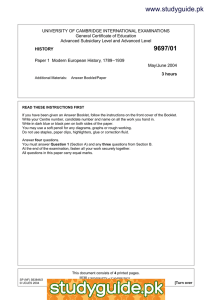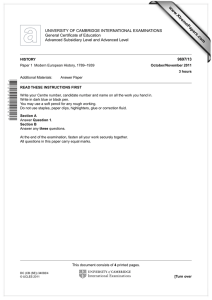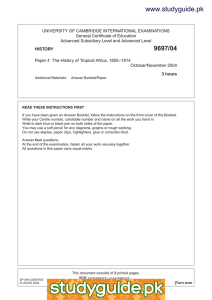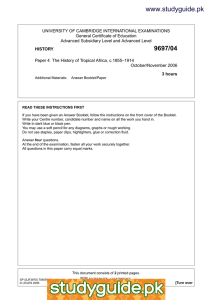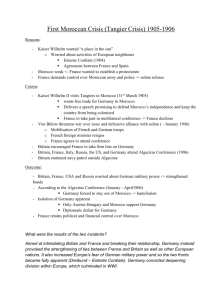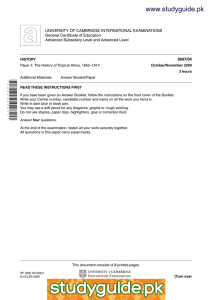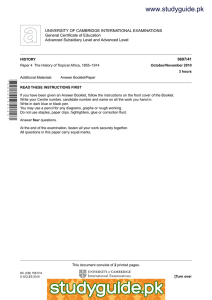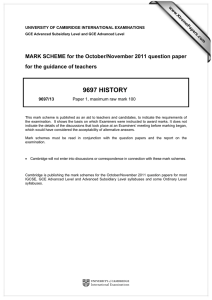UNIVERSITY OF CAMBRIDGE INTERNATIONAL EXAMINATIONS General Certificate of Education www.XtremePapers.com
advertisement
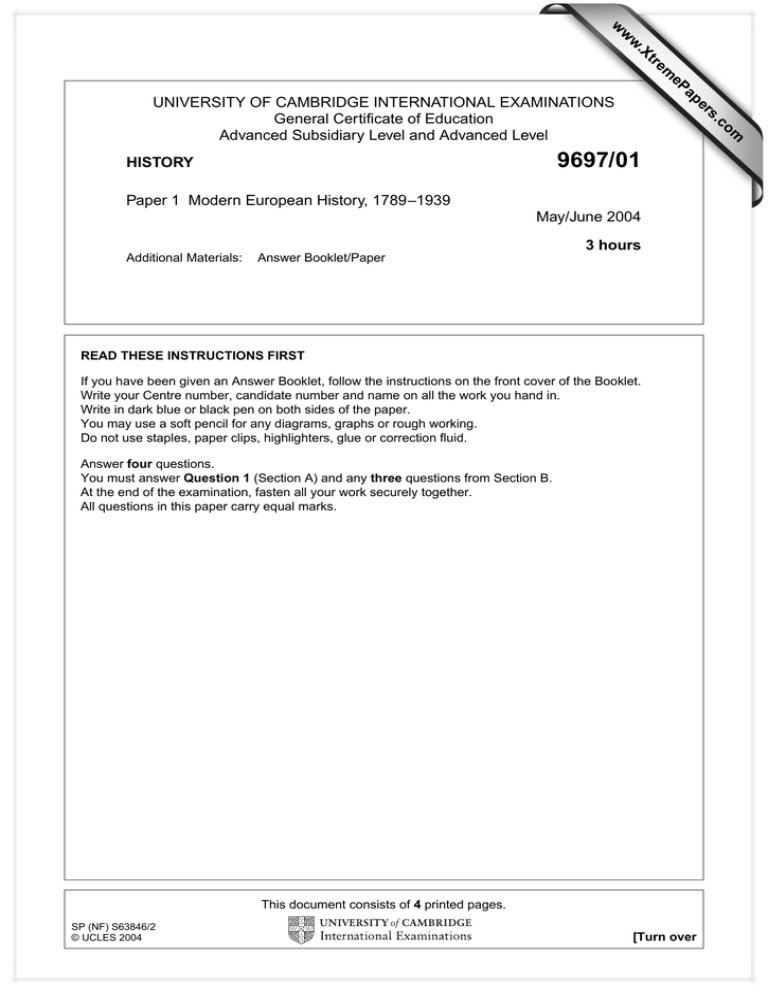
w w ap eP m e tr .X w om .c s er UNIVERSITY OF CAMBRIDGE INTERNATIONAL EXAMINATIONS General Certificate of Education Advanced Subsidiary Level and Advanced Level 9697/01 HISTORY Paper 1 Modern European History, 1789–1939 May/June 2004 3 hours Additional Materials: Answer Booklet/Paper READ THESE INSTRUCTIONS FIRST If you have been given an Answer Booklet, follow the instructions on the front cover of the Booklet. Write your Centre number, candidate number and name on all the work you hand in. Write in dark blue or black pen on both sides of the paper. You may use a soft pencil for any diagrams, graphs or rough working. Do not use staples, paper clips, highlighters, glue or correction fluid. Answer four questions. You must answer Question 1 (Section A) and any three questions from Section B. At the end of the examination, fasten all your work securely together. All questions in this paper carry equal marks. This document consists of 4 printed pages. SP (NF) S63846/2 © UCLES 2004 [Turn over 2 SECTION A: THE ORIGINS OF WORLD WAR I, 1870–1914 You must answer Question 1. THE GREAT POWERS AND THE MOROCCO CRISIS, 1911 1 Read the sources, and then answer the question. Source A ARTICLE 2. The French government declares that it has no intention of altering the political status of Morocco. A large part of France’s borders are near those of Morocco. Therefore, the British government recognises that it is France’s right to preserve order in that country, and to provide assistance for the purpose of all administrative, economic, financial, and military reforms which it may require. The British government declares that it will not obstruct any action taken by France for this purpose, provided that such action shall leave intact the rights which Britain, because of treaties and tradition, enjoys in Morocco, including the right of trade with the ports of Morocco, enjoyed by British vessels since 1901. The Entente Cordiale between Britain and France, 8 April 1904. Source B The question is whether we should build single naval bases or colonies. I prefer colonies because colonies will directly affect Europe in the event of a war. We should raise demands for colonies in the press and in public meetings. Then I can say, ‘I am ready to compromise but public opinion must be considered’. We shall stand firm in Morocco although we might seem to draw back a step. You may be sure that our Morocco policy will please you. You will be satisfied. Kiderlen-Wächter, German Foreign Secretary, in conversation with Class, an extreme German nationalist, April 1911. Source C I must return home at once. I can’t let my government take this sort of action without being right on the spot in order to keep a careful watch on the consequences. Anything else would be unpardonable and give too much power to the politicians. We shall be steering straight for military mobilisation! That must not happen WITHOUT ME! Besides, our allies must be informed about this! We must gain their support! Kaiser William II’s handwritten notes on a recommendation from Kiderlen-Wächter that Germany should take ‘a very strong line’ with France over Morocco, July 1911. © UCLES 2004 9697/01/M/J/04 3 Source D The only real crisis in Anglo-German relations between 1904 and 1914 happened in the summer of 1911 because of the way in which German political leaders tried to resolve the Moroccan crisis that was causing trouble between us and the French. Kiderlen-Wächter, the German Foreign Secretary, lacked a sufficient understanding of Britain, like so many German diplomats. He did harm by his careless handling of the situation. At his suggestion, the German Chancellor sent the gunboat Panther to the Moroccan port of Agadir in 1911. He left the British government in the dark when it asked the reason and did not reply for several weeks. The result was that Lloyd George delivered a speech which had been drawn up in the British Cabinet in which he warned Germany that British power would be on the side of France in the event of a challenge. I was aware of this mistaken policy as soon as I learned that we had not previously come to an agreement with Britain. The result was that our prestige suffered a blow throughout the whole world and German public opinion disapproved. Grand Admiral von Tirpitz, Naval Secretary, Memoirs, published 1919. Source E I support all means that would settle international disputes by negotiation. But I am also bound to say this: I believe that it is essential in the highest interests, not merely of this country, but of the world, that Britain should at all costs maintain her place and her power amongst the Great Powers of the world. Her influence has been many times in the past, and may be in the future, invaluable to the cause of human liberty. It has more than once in the past saved Continental nations from overwhelming disaster. I would make great sacrifices to preserve peace. But if a situation were to be forced upon us in which peace could only be preserved by the surrender of the great position Britain has won by centuries of heroism and achievement, then I say emphatically that peace at that price would be too humiliating for a great country like ours to endure. When her interests are vitally affected, Britain must not be treated by other countries as if she were of no account. The security of our great international trade is at stake. The peace of the world is at stake. David Lloyd George, a leading British minister, in the speech referred to in Source D, 21 July 1911. Now answer the following question. ‘Germany’s policies in the Morocco Crisis (1911) were unreasonable.’ Use Sources A–E to show how far the evidence confirms this statement. © UCLES 2004 9697/01/M/J/04 [Turn over 4 SECTION B You must answer three questions from this section. 2 How far did Napoleon Bonaparte achieve his aims in domestic policy? 3 Why has industrialisation in the nineteenth century been described as a ‘revolution’? 4 ‘The aims and methods of Cavour were completely different from those of Mazzini.’ How far do you agree with this judgement? 5 Explain the factors which attracted European imperialism either to Africa or to Asia in the later nineteenth century. 6 Why did Lenin and the Bolsheviks gain power in 1917? 7 How important was the ‘cult of personality’ to Hitler’s rule in the period to 1939? 8 Nicholas II and Stalin were both autocrats. Why then, was Stalin more successful than Nicholas II in governing Russia? University of Cambridge International Examinations is part of the University of Cambridge Local Examinations Syndicate (UCLES), which is itself a department of the University of Cambridge. © UCLES 2004 9697/01/M/J/04
